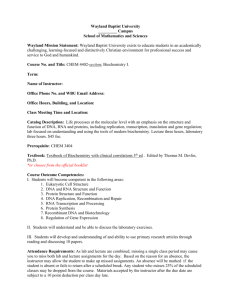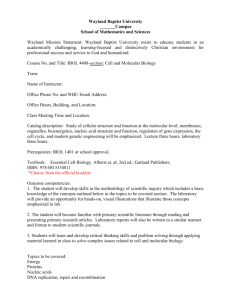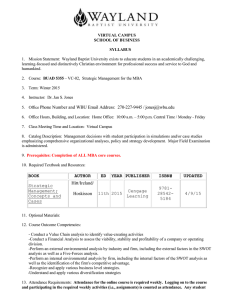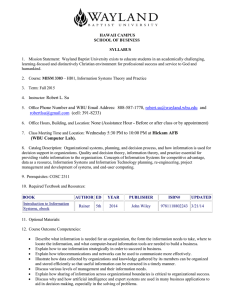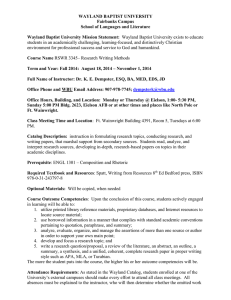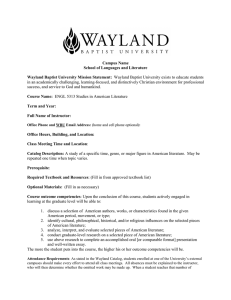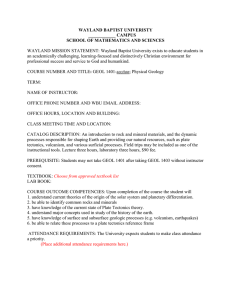Wayland Baptist University _________ Campus School of Mathematics and Sciences
advertisement
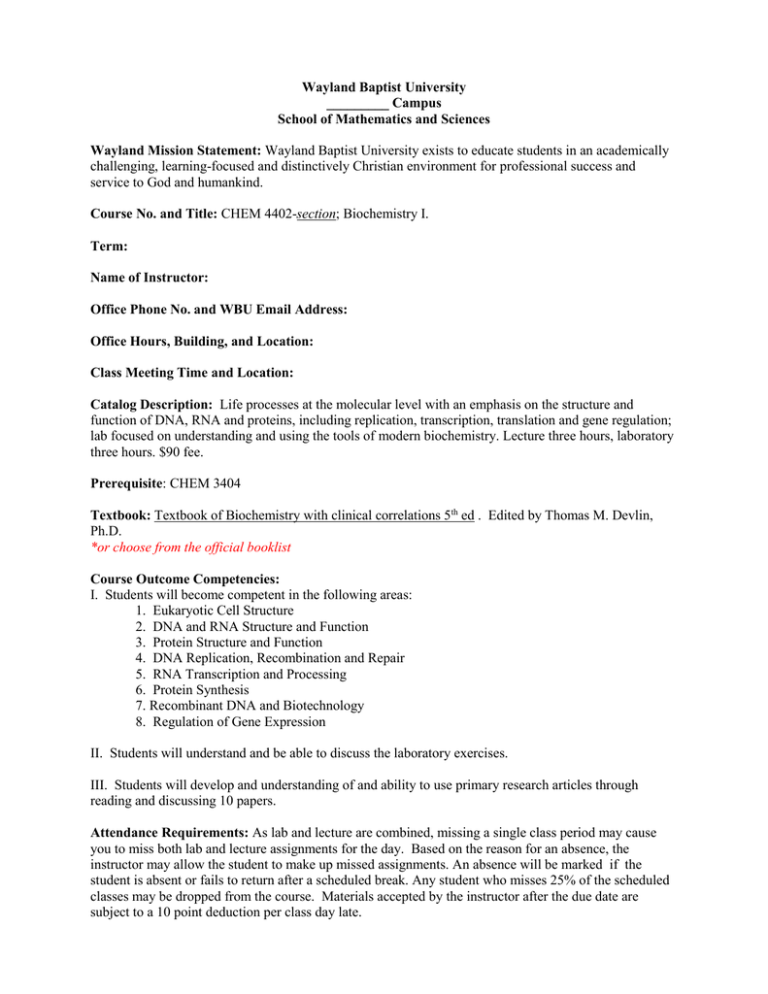
Wayland Baptist University _________ Campus School of Mathematics and Sciences Wayland Mission Statement: Wayland Baptist University exists to educate students in an academically challenging, learning-focused and distinctively Christian environment for professional success and service to God and humankind. Course No. and Title: CHEM 4402-section; Biochemistry I. Term: Name of Instructor: Office Phone No. and WBU Email Address: Office Hours, Building, and Location: Class Meeting Time and Location: Catalog Description: Life processes at the molecular level with an emphasis on the structure and function of DNA, RNA and proteins, including replication, transcription, translation and gene regulation; lab focused on understanding and using the tools of modern biochemistry. Lecture three hours, laboratory three hours. $90 fee. Prerequisite: CHEM 3404 Textbook: Textbook of Biochemistry with clinical correlations 5th ed . Edited by Thomas M. Devlin, Ph.D. *or choose from the official booklist Course Outcome Competencies: I. Students will become competent in the following areas: 1. Eukaryotic Cell Structure 2. DNA and RNA Structure and Function 3. Protein Structure and Function 4. DNA Replication, Recombination and Repair 5. RNA Transcription and Processing 6. Protein Synthesis 7. Recombinant DNA and Biotechnology 8. Regulation of Gene Expression II. Students will understand and be able to discuss the laboratory exercises. III. Students will develop and understanding of and ability to use primary research articles through reading and discussing 10 papers. Attendance Requirements: As lab and lecture are combined, missing a single class period may cause you to miss both lab and lecture assignments for the day. Based on the reason for an absence, the instructor may allow the student to make up missed assignments. An absence will be marked if the student is absent or fails to return after a scheduled break. Any student who misses 25% of the scheduled classes may be dropped from the course. Materials accepted by the instructor after the due date are subject to a 10 point deduction per class day late. No make-up exams will be given unless arrangements are made in advance of the absence, except in the case of an emergency. Statement on Plagiarism and Academic Dishonesty: Wayland Baptist University observes a zero tolerance policy regarding academic dishonesty. Per university policy as described in the academic catalog, all cases of academic dishonesty will be reported and second offenses will result in suspension from the university. Disability Statement: In compliance with the Americans with Disabilities Act of 1990 (ADA), it is the policy of Wayland Baptist University that no otherwise qualified person with a disability be excluded from participation in, be denied the benefits of, or be subject to discrimination under any educational program or activity in the university. The Coordinator of Counseling Services serves as the coordinator of students with a disability and should be contacted concerning accommodation requests at (806) 291-3765. Documentation of a disability must accompany any request for accommodations. It is the responsibility of the student to inform the instructor of any disability that may require accommodation during the lecture or laboratory portions of the course. It is of particular importance to report any condition or disability that may affect the laboratory safety of the individual or others. Information provided for this purpose will be kept strictly confidential and will not in any way affect the individual’s course grade. Course Requirements and Grading Criteria: 1. Students are expected to read the textbook assignments before class and compile a complete set of notes from the text and lecture. 2. Lectures are illustrated with slides, videos and discussion. Students are encouraged to ask questions and be active participants in the discussions of the material presented. 3. The laboratory experience will be directed toward problem solving and scientific inquiry using modern biochemical approaches. Additional laboratory exercises will be to read, understand and discuss primary research articles from time to time. Students are required to write up all of the experiments performed in the lab and maintain a journal/lab notebook which will be turned in every few weeks. 4. I will choose 10 scientific papers during the semester for each student to read during the semester, an average of 1 per week with obviously a number of weeks off. There will be a set of questions specific to each paper for you to answer as you read each paper. Most of these will be downloadable directly from blackboard as PDF files. The questions will be deposited in the blackboard drop box. Feel free to discuss the papers on the discussion board in blackboard. The average of these question sets will count as 1 exam grade. 5. At least 3 “typical” exams (multiple guess short answer and essay), a week long take-home exam as well as a comprehensive final examination will be given. Lab grades will be 3/4 your lab notebook (all major lab exercises must be written up and kept in a lab composition – type book). The remaining ¼ of the lab will be from an oral exam at the end of the course where you convince me that you really know what we did and why. Course evaluation: The exam grades will be averaged together to comprise ¾ of the course grade and the lab will make up the remaining ¼ of the overall grade. University grading system: A 90-100 B 80-89 C 79-80 D 60-79 F below 60 I incomplete W withdrawal Students shall have protection through orderly procedures against prejudices or capricious academic evaluation. A student who believes that he or she has not been held to realistic academic standards, just evaluation procedures, or appropriate grading, may appeal the final grade given in the course by using the student grade appeal process described in the Academic Catalog. Appeals may not be made for advanced placement examinations or course bypass examinations. Appeals are limited to the final course grade, which may be upheld, raised, or lowered at any stage of the appeal process. Any recommendation to lower a course grade must be submitted through the Executive Vice President/Provost to the Faculty Assembly Grade Appeals Committee for review and approval. The Faculty Assembly Grade Appeals Committee may instruct that the course grade be upheld, raised, or lowered to a more proper evaluation. Tentative Schedule : Revised 03/18/15
